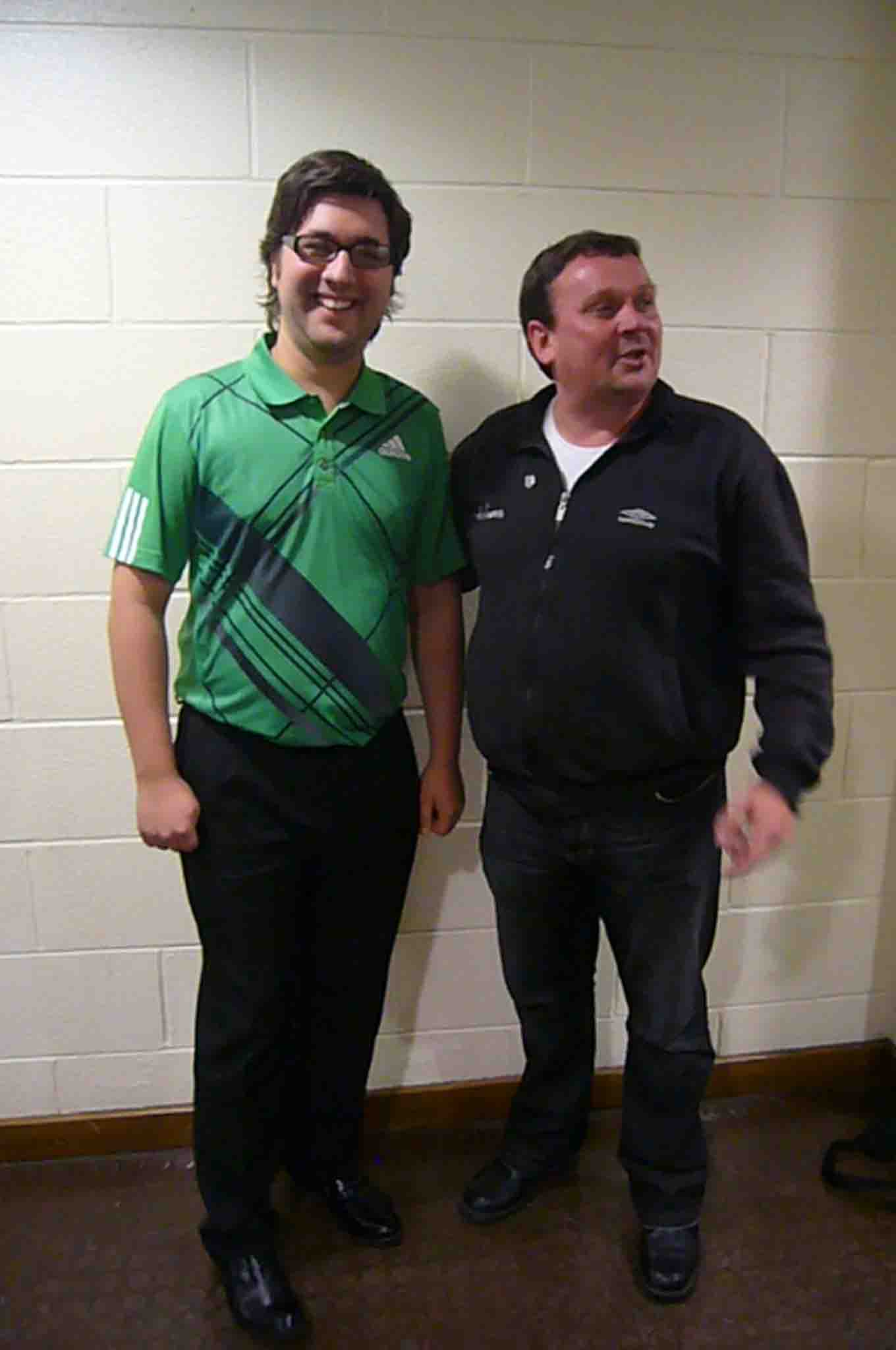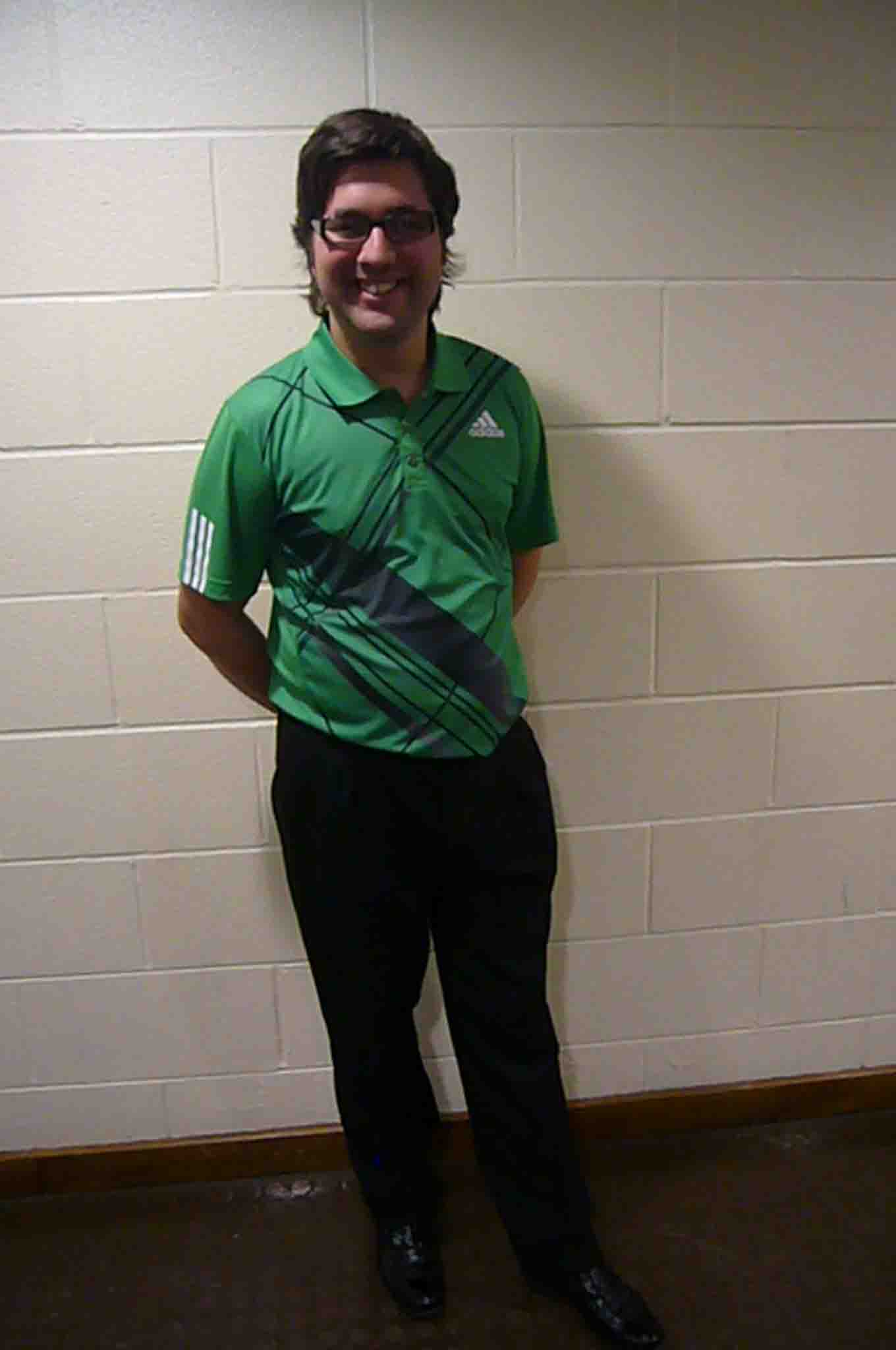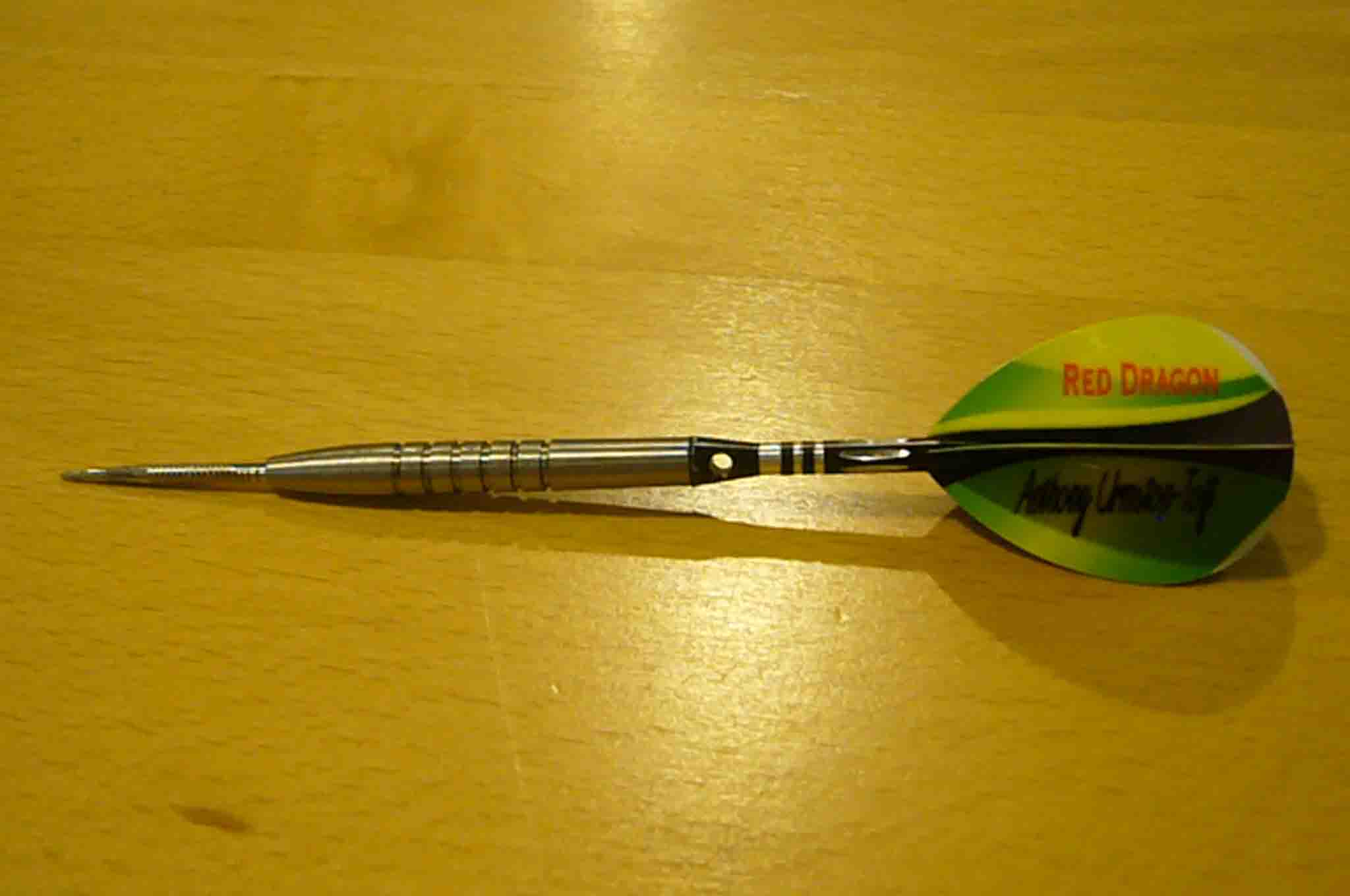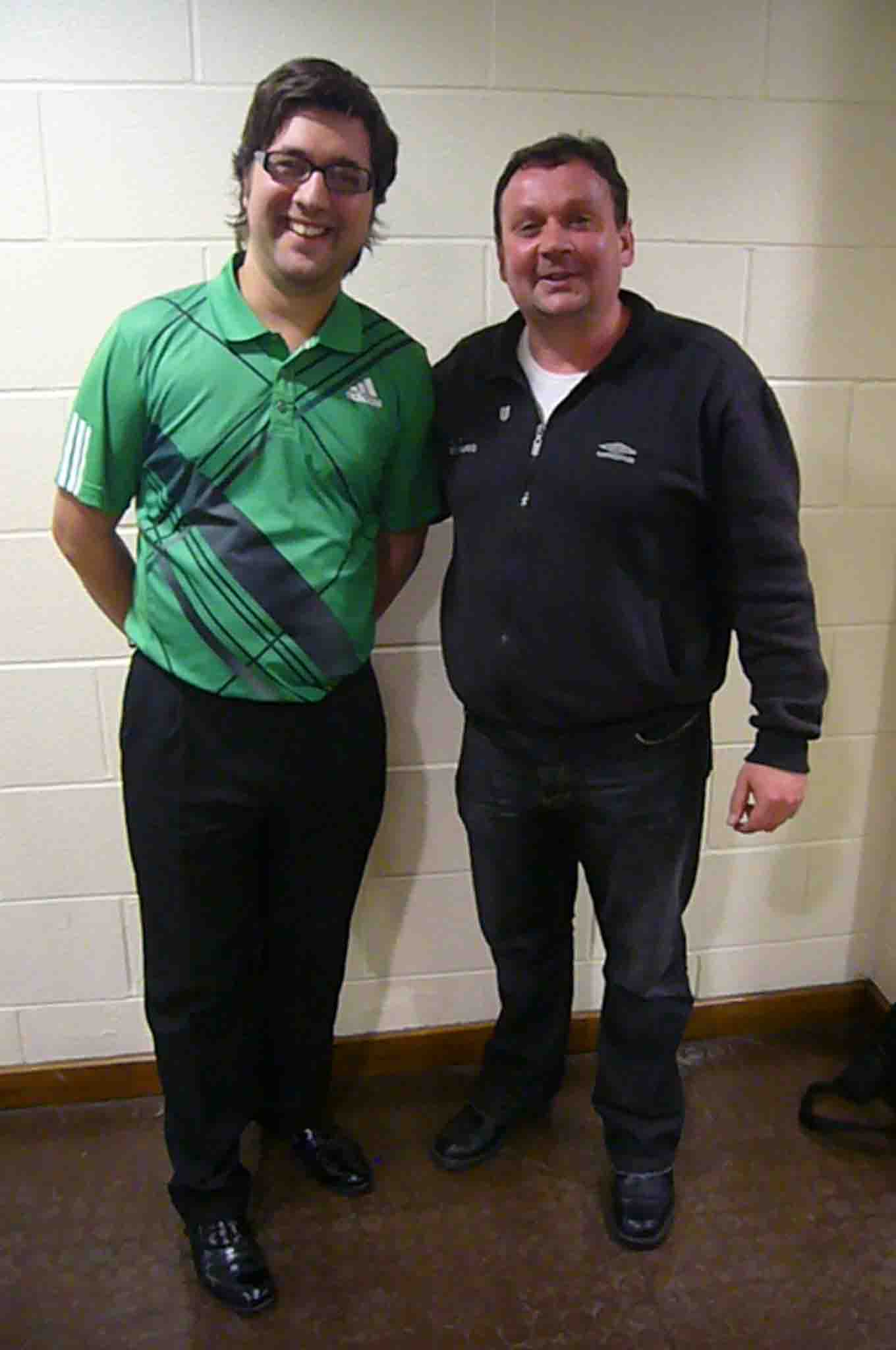Interview with Paul Gillings and Anthony Urmston-Toft
New ways to practice

Since March this year the sports scientist Paul Gillings and the young PDC dart pro Anthony Urmston-Toft have worked together. I met them both a short time after their partnership started at a players championship in Wigan. Now - exactly three months later - I did the following interview with them to find out more about them and their partnership.
Paul - you probably already had a job before you started sports science, what did you do?
I worked in the property investment field.
And what did you study at university?
I took the subject of football studies.
I suppose that has to do with football - but what exactly does that mean?
It was many different areas all associated with football. You learn about, management, sports psychology, practice methods, coaching, the sociology of sport, as well as business areas such as marketing and accountancy. And it also comprised of topics like performance analysis, the right diet and physical fitness. I then took a masters degree specialising in the performance analysis of sport.
And why then did you decide on darts - you probably could coach a football team now. Are you perhaps a dartplayer yourself?
Well, not really. I played a little darts but I was never involved in the sport. But when I looked for a topic for my paper I realised that
rarely had a sport scientist, until now, ever dealt with darts. There were very few studies as well. So I chose "performance enhancing areas in
darts" as my subject. Most of the players taking part were pub/County players but a few pro players answered as well.
And when I had finished I thought maybe I could earn my living not working with football players but with dart players. No one has ever done it
until now and I thought maybe I could develop a new market.
Can one just transfer "football knowledge" into darts?
Though of course my study concerned football the basic practice methods or training schemes, performance analysis or healthy food is the same in all sports. Of course dart player practices different things to a football player, but I can help him with an effective practice schedule or find out in which way he can improve his performance.
Do you look into the throw or the equipment as well?
No. I think the throw or the technique in darts is something very individual - I don't interfere with it.
And how now does you partnership with Anthony look?
I travel with him to the tournaments, I watch his matches and write down the scores which I later analyse and he first gets feedback after the match from me and then more detailed feedback later
Is that all?
No, we usually talk a few times during the week on the phone about the matches and try to assess it. And of course discuss how to include our insight into his practice and deal with any other issues that have shown up during the previous games.
And how did it all develop over the three months?
I would say it would be better to let Anthony answer this question ?.
Anthony, how would you see the development?
I can see an improvement. The mental part plays an important part in darts and what we do together helped my nervousness, I am no
longer so nervous starting a match.
 And many players told me they are impressed by my attitude and by the fact I don't lose composure when I am behind in a match. It is a very
important step on your way to success to learn how to be a good loser, to be gracious in defeat. That doesn't mean of course that I don't
mind losing ?.
And many players told me they are impressed by my attitude and by the fact I don't lose composure when I am behind in a match. It is a very
important step on your way to success to learn how to be a good loser, to be gracious in defeat. That doesn't mean of course that I don't
mind losing ?.
How does it feel to be accompanied by a coach to the tournaments?
It feels much better then to be accompanied by family. Being accompanied by the family or my wife is often very emotional and brings a lot of pressure. With Paul I've got backing his which is more matter-of-fact or business-like- that helps.
How long have you been playing darts, Anthony?
I threw my first dart when I was four years old. It was not real darts - it was toy darts for children. But from then on I played and I loved it. My father always brought the height of the bull in line with my height and when I was grown-up the height of the bull had reached the stipulated height too. I played in the pub, I played league, I played county first for Lancashire and when I no longer felt comfortable there for Mercyside and I was always playing with a fair amount of success.
You are 25 now - did you never take a break?
When I went to university I stopped playing. I had entered the PDC when I was 18 but stopped then for a few years and now I am back.
What did you study?
It's called hospitality management. It has to do with catering or leading a restaurant.
Might be leading a hotel?
Yes - or leading a hotel. I could do that but I still work in catering.
When I first met you three months ago you were hoping someone would produce you your "ideal dart". Now I hear Red Dragon produced it for you - how did that happen?
I think I've got hundreds of sets of darts at home and bags of flights and other equipment. Everybody always gave me darts as a present
knowing I love darts. I always preferred a weight between 21 and 23 g. I've got John Part's and John Lowe's but no dart really was like I
would have liked it. I always had some ideal in my head of what I really wanted..
 And finally Red Dragon agreed to do it for me and I spent a whole day there in the lab with Lee. I am very happy with the result. I always
wanted a well-balanced dart neither front nor back loaded. It's is just better for accuracy. What I've got now looks a little bit like the
John Lowe dart but the barrel is longer and the grip is broader. The nose is a little bit more flat. And I've got long grooved points because
I grip my dart far at the front. The flat nose and the long points help to a better grouping. And I've got special flight with
aluminium shafts.
And finally Red Dragon agreed to do it for me and I spent a whole day there in the lab with Lee. I am very happy with the result. I always
wanted a well-balanced dart neither front nor back loaded. It's is just better for accuracy. What I've got now looks a little bit like the
John Lowe dart but the barrel is longer and the grip is broader. The nose is a little bit more flat. And I've got long grooved points because
I grip my dart far at the front. The flat nose and the long points help to a better grouping. And I've got special flight with
aluminium shafts.
Paul: I accompanied Anthony to Red Dragon and this day really was an experience. And Anthony started in his first match this weekend with a 180. It's the first time he used the darts in a tournament. Lee and Simon at Red Dragon seemed to be delighted with them as well.
Anthony: Yes - they'll maybe even bring them on the market later this year. They are always looking for new ideas and this is certainly something new. But I've no idea under which name they will sell them only that they will not be yet Anthony Urmston-Toft darts...
Do you know how much they'll cost?
No idea. They are 95 % Tungsten darts and I know to produce this prototype did cost £2000
Paul - do you have any idea of dart design? Or which affect the design has on the throw?
No -that's something I know anything at all about. But Anthony knows. He immediately notices it when a player has changed anything in his equipment or in his throwing style.
Anthony: Yes, that's true. And I can always tell what an effect it will have as well. I know exactly what will happen should a player change his flight or should he draw his dart very far back before release. That's something I of course use for my techniques and in my practice.
And are you able to predict the result of a match then too??
I would say I can sometimes predict it when I look at the players before a match:
Paul - do you watch the other players play?
Yes when I've the opportunity I always watch Anthony's possible opponents before he meets them. And I watch tournaments on TV of course. But when I accompany Anthony I usually concentrate on him, his matches and his scores.
Did you in anyway set a time limit for your partnership?
No - Anthony is guinea-pig or as we prefer, a pioneer ? and we will just wait and see what will happen. But I can imagine that Anthony
will one day be more or less on his own, perhaps with me in the background.
My original idea was that to earn my living with this I probably would have to work with several players though from the experience of the
past few months that it would be difficult should they all play in the same tournaments. We do a lot of preparation thought before a
tournament begins.
But our partnership has already developed into something new anyway and we now plan to launch perhaps a coaching book or a coaching course
or perhaps look at coaching youth players - it's all only ideas at the moment and of course we'll not yet reveal all the details!!!
How much do you practice, Anthony?
I practice two to three hours a day and together with Paul I try to make my practice more effective.
That sounds promising- a sports scientist with knowledge in coaching, performance analysis, and sports psychology works together with a player with a great inside in techniques and equipment. But isn't darts too individual for a comparatively inflexible coaching course?
Paul: Of course one had to adjust it to the individual player. The practice consists of several building blocks which you can adjust without a problem to the skill level and the needs of a player. What is important as well is that players learn to keep score of their practice results to find out whether what they do in practice is effective or not.
Paul - that would be a totally new and modern way. How does the alcohol then fit in?
My study showed that 85 % of the players use alcohol as a performance enhancing drug. It is arguably true that a little bit of alcohol
help to settle the nerves. The emphasis lies on little; the amount of alcohol most players in the survey drink has the totally opposite effect.
I think that the future will be darts without alcohol at least at the pro level.
And it is not really necessary for you drink alcohol when you are in the pub though of course you can be lead astray
by your friends and team mates ?. Also, darts for many is a social game, the social aspect is more important than the
result of a darts match.
If you look at Anthony - he is potentially some kind of model darter for the future, in as much as he has decided against following the
current culture of professional darts and not drinking. The same as most other profession sportsmen do. The only reason people see that
as unusual is because he is a dart player!
Don't you drink alcohol, Anthony?
Yes, I do from time to time drink alcohol but not much and none at all when I play darts. To play darts is my job and you can't normally drink at work. I drink tea which I sometimes even bring myself. But drinking and eating during a tournament is a problem anyway - there is no real alternative to the alcohol and most of the time beer is the cheapest drink you can get.
Paul: The food is not much better at the venues. You only have to look at what they offer and compare it to the food other competitors in Pro Sports eat during a competition. And how important they think the food is.
Anthony: That could be something the PDC could change - maybe offer a healthy food option at the venues. Physical fitness gets more and more important for the players - a healthy food option may be one way of promoting the importance of keeping fit.
So you two think the future belongs to the none drinking, fit player who keeps a healthy diet and has a coach - some kind of darts athlete?
Anthony: Yes, that's what I think. Until now players have always had managers but they do totally different things. And I can't imagine players who do not prepare professionally for a tournament will survive in the long run.
Now I really wonder what will happen to your plans and your ideas.
Paul: We will keep you updated.
